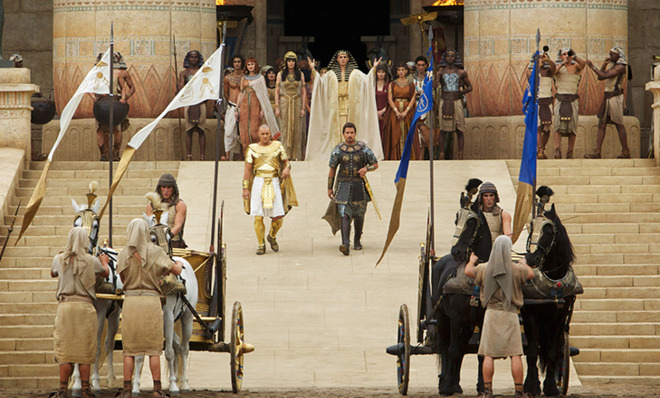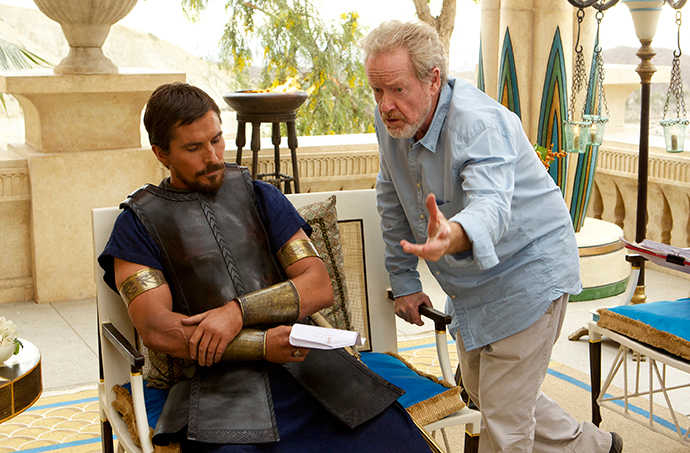Why does Hollywood keep barring minorities from Biblical blockbusters?
Ridley Scott's Exodus is hardly alone. And it's long past time for change.


A free daily email with the biggest news stories of the day – and the best features from TheWeek.com
You are now subscribed
Your newsletter sign-up was successful
Ridley Scott's Exodus has almost every ingredient necessary to make a holiday blockbuster: a timeless tale, killer cast, massive budget, pre-release media buzz, stunning special effects, and an impressive director. But if moviegoers look deeper, they'll notice one ingredient is painfully missing: melanin.
Scott's big-budget film takes place in North Africa thousands of years ago. In real life, everyone would have had dark skin. But the movie is populated by an almost completely Caucasian cast. Welsh-born Christian Bale stars as the Hebrew liberator, Moses. Australian Joel Edgerton plays Pharaoh, and American Sigourney Weaver was almost laughably cast as an African queen.
Vanity Fair notes that most of the actors of color who have been cast were relegated to nameless roles. (Exceptions may include smaller roles for Ben Kingsley, a Brit with an Indian father, and John Turturro, an Italian-American.) The Independent adds that black and ethnic minorities do appear in the cast as "Ramses servant," "Egyptian thief," and "Egyptian Lower Class Civilian."
The Week
Escape your echo chamber. Get the facts behind the news, plus analysis from multiple perspectives.

Sign up for The Week's Free Newsletters
From our morning news briefing to a weekly Good News Newsletter, get the best of The Week delivered directly to your inbox.
From our morning news briefing to a weekly Good News Newsletter, get the best of The Week delivered directly to your inbox.
We can't claim that Scott's casting decisions were pernicious. They are, however, historically inaccurate and, frankly, inexcusable for a film in 2014.
Sadly, Ridley Scott is hardly alone. Whitewashing Bible films is something of a Hollywood tradition spanning decades, and it won't change until audiences demand better.
The last time a live-action Moses appeared on the silver screen was in Cecil B. DeMille's The Ten Commandments." It starred a fake-baked Charlton Heston. But okay, that was 1956. Surely Hollywood's sensitivity to ethnicity has changed in the last half-century, right?
Wrong.
A free daily email with the biggest news stories of the day – and the best features from TheWeek.com
— King of Kings (1961) cast American Jeffrey Hunter as Jesus and Irish actress Siobhan McKenna as Mary.
— The Greatest Story Ever Told (1965) cast the Swedish actor Max von Sydow as Jesus, American Dorothy McGuire as the Virgin Mary, and American Charlton Heston as John the Baptist.
— King David (1985) cast American Richard Gere as the famed Hebrew monarch.
— The Last Temptation of Christ (1988) cast American Willem Dafoe as Jesus, American Harvey Keitel as Judas Iscariot, and American Barbara Hershey as Mary Magdalene.
— The Passion of the Christ (2004) cast American Jim Caviezel as Jesus. Romanian Maia Morgenstern was cast as Mary.
— The Nativity Story (2006) cast Australian-born New Zealander Keisha Castle-Hughes as Mary.
— Noah cast Australian Russell Crowe as Noah, American Jennifer Connelly as Noah's wife, Welshman Anthony Hopkins as Noah's father, American Logan Lerman and British Douglas Booth as Noah's sons, and Briton Emma Watson as Noah's daughter-in-law.
— Son of God (2014) cast the Portuguese Diogo Morgado as Jesus and the Irish Roma Downey as Mary. The film was taken, in part, from footage from History Channel's The Bible series, which featured a mostly Caucasian cast, except for the role of Samson, a raging brute with a weakness for pretty white girls.
Why is progressive Hollywood so allergic to casting people of color in Bible films? Noah's screenwriter explained his all-white cast by saying that the movie was "mythical." Apparently, every fantasy land is inhabited by Caucasians with pristine, high-caste British accents.
Here's the real answer to that question: Hollywood does not believe people of color are lucrative enough.
Scott told Variety that he never considered the matter of race because he simply could not have financed the film if he had cast "Mohammed so-and-so from such-and-such" in it. Really.

The insensitivity in Scott's comments and assertion that a movie's viability depends solely on casting it with famous white people is depressing, if not disturbing.
To be fair, Hollywood's race problem is endemic and not limited to Bible films. According to a 2011 study by UCLA's Bunche Center for African-American Studies, white actors are cast in approximately 90 percent of lead roles of theatrical films. As Alex Abad-Santos of Vox commented, "That means they're more likely to become big stars, making it even harder for non-white actors to take those lead roles and become big stars themselves."
Moviegoers don't seem concerned about this disparity, but they should be outraged. Why is it that white people slathered in bronzer can play almost any race but people of color can only play people of color? What would happen if a serious director cast Denzel Washington to play George Washington or Morgan Freeman to play Winston Churchill? How would moviegoers react?
And the stakes with Bible films are even higher than with other movies.
"Biblical stories are more than just stories. They are seen by many as reflections of truth," says Edward Blum, a professor at San Diego State University and author of The Color of Christ: The Son of God and the Saga of Race in America. "The 'truth' in these representations is that white is coded good, heroic, and godly, and dark is coded evil, wrong, or wicked."
When these stories are whitewashed, it creates unnecessary distance between people of color and important spiritual stories, and worse, between minorities and God. As a friend of mine who is African-American told me, he assumed as a child that Jesus was "the white man's God."
"In these Biblical stories, God isn't absent and God takes a side," Blum says. "When God always seems to be on the side — or with — the white characters in Biblical representations then we can't imagine God having different racial sensibilities."
Some potential movie watchers have responded to Scott's whitewashed cast by calling for a boycott of the film. There is even an ongoing Twitter protest, accompanied by a number of hashtags, such as #boycottexodusmovie. But protests don't always work, and we need more lasting change. Instead, we should see Exodus as an opportunity to begin engaging major studios in vibrant, ongoing conversations about race. And this needs to happen before movies are made, not after they are released.
The Exodus narrative ironically has something to say about this. It's an ancient civil rights story about liberation and justice, of one man speaking truth to power, and of a God who desires for people to be free and equal. Ridley Scott ignored the core truths of this story in his casting decisions, but we don't have to do the same in the ways we respond.
Jonathan Merritt is author of the book Learning to Speak God from Scratch: Why Sacred Words are Vanishing — and How We Can Revive Them and a contributing writer for The Atlantic.
-
 6 of the world’s most accessible destinations
6 of the world’s most accessible destinationsThe Week Recommends Experience all of Berlin, Singapore and Sydney
-
 How the FCC’s ‘equal time’ rule works
How the FCC’s ‘equal time’ rule worksIn the Spotlight The law is at the heart of the Colbert-CBS conflict
-
 What is the endgame in the DHS shutdown?
What is the endgame in the DHS shutdown?Today’s Big Question Democrats want to rein in ICE’s immigration crackdown
